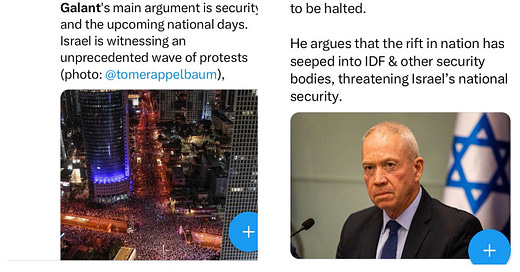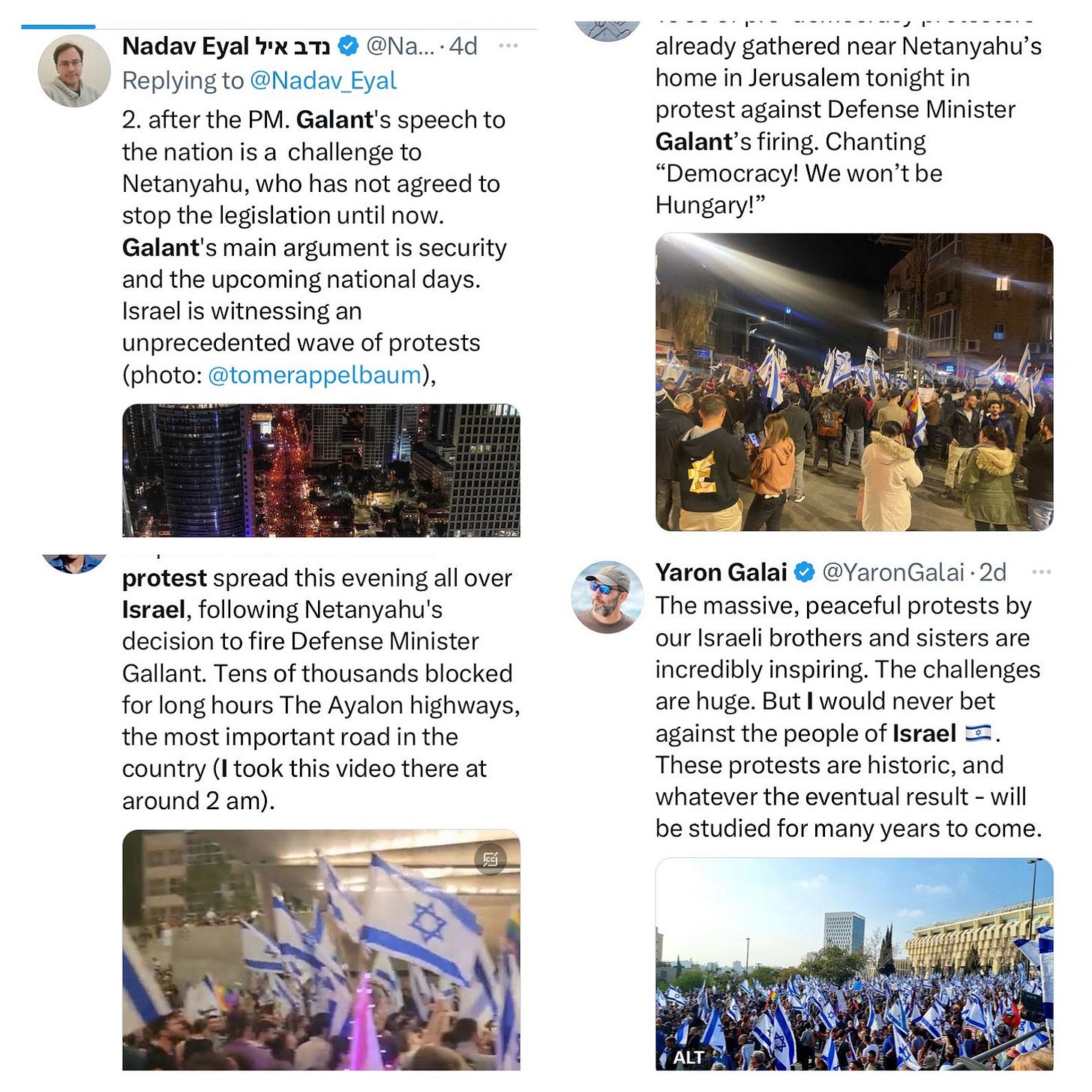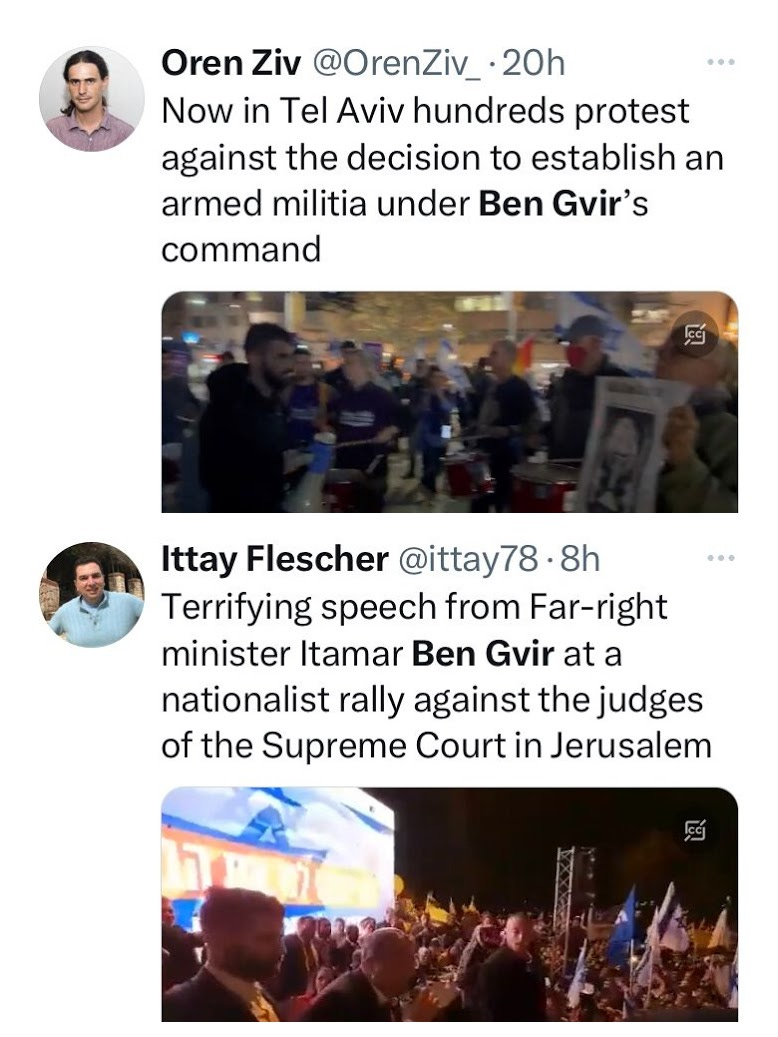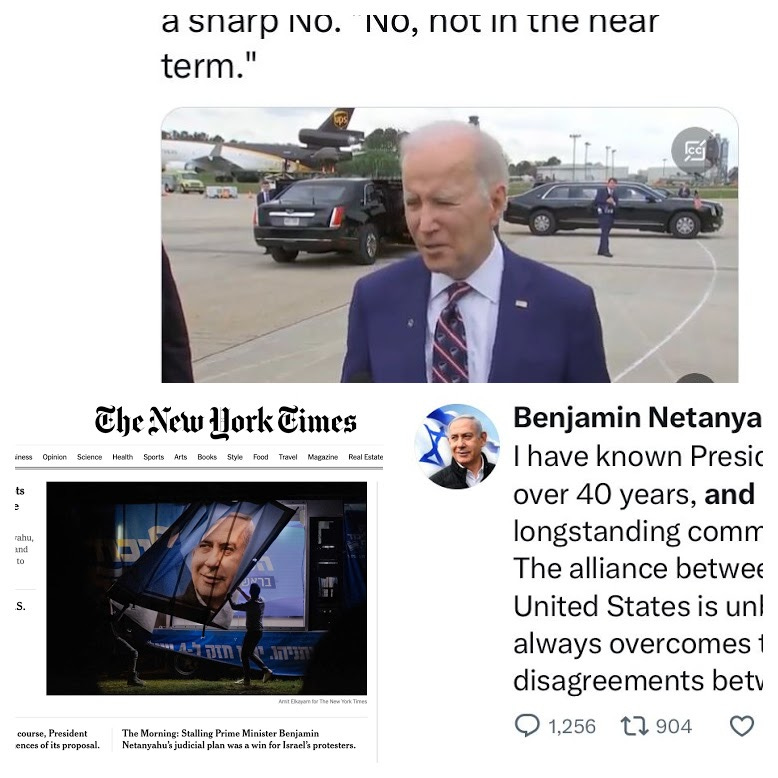Your Weekly Israel News Roundup, Special Judicial Overhaul Edition, March 31, 2023
5 Major Events
Defense Minister Yoav Galant Called on PM Netanyahu and the Government to Pause the Judicial Overhaul, Netanyahu Decided to Fire Him: On Saturday night Galant expressed his deep concerns for the motivation of reserve soldiers to report for duty, due to the judicial overhaul, and said that this is disturbing the army and threatening the security of Israel. The most meaningful pressure came from the fighter pilots, mainly because the Israeli air force is dependent on reserve pilots to meet all their operational requirements. If reserve pilots do not report for duty, the air force will be unable to execute its military missions. Galant, an ex-army general, was under a lot of pressure from his peer group, people who served with him in the special forces marine unit, and from other ex-army officers and soldiers. In the last weeks there were constant demonstrations in front of his house and in other places he visited, calling on him to take a stand and call for a pause to start negotiations with the opposition. Sunday afternoon PM Netanyahu announced that he is firing him.
Wave of Protests and Counter Protests Erupted Following the Removal of Galant as Minister of Defense and the Suspension of Overhaul Legislation: within minutes of the PM’S announcement of the removal of Gallant, hundreds of thousands of people across the country took to the streets and major intersections, in the biggest mass demonstrations against the judicial overhaul to date.
In Tel Aviv, protesters blocked the Ayalon highway for hours, into the night. In Jerusalem, protesters marched towards the Prime Minister’s residence and were stopped from continuing a few blocks away. The police contained the protests for several hours, but then dispersed them with water cannons. In Tel Aviv, before ordering the dispersal of the protest, the central precinct chief of police marched with protesters.
The dismissal of Gallant was a watershed moment for institutions and organizations who had refrained, up till that point, from openly joining the resistance to the judicial overhaul. On Sunday evening, the heads of all research universities released a joint announcement that all classes are cancelled until the judicial overhaul legislation is halted. Shortly afterwards, the head of the Histadrut, Israel’s largest and most powerful labor union, announced a general strike. The private sector was quick to follow. Israel’s international airport was closed, flights were cancelled, and shopping centers and chain stores were closed.
The general impression was that the national controversy and divide over the judicial overhaul had reached a boiling point, and that Netanyahu must suspend the legislative process and enter negotiations with the opposition. Which he did, after a day of mass protests and counter protests.
Surprisingly, the media later reported that the general strike as announced by the Histadrut, including hospitals, the airport and international ports, was coordinated between PM Netanyahu and chair of the Histadrut, Arnon Bar David. The purpose was to create a critical situation that would force Netanyahu to suspend the rapid progress of the judicial overhaul legislation.
With the suspension of the overhaul legislation and the commencement of negotiations between the coalition to supposedly reach a compromise on the judicial overhaul, tens of thousands of right wing voters held demonstrations in Jerusalem and Tel Aviv, in support of the overhaul.
PM Netanyahu Announced A Pause in the Judicial Overhaul and Willingness to Start Talks With the Opposition in an Attempt to Reach a Compromise: After the general strike, and a turbulent day of demonstrations, Netanyahu announced in a televised speech to the nation that he agrees to take a pause, to prevent a civil war. He was able to deliver his speech only after a long meeting with one of the most extreme members of his cabinet, the head of Otsma Yehudit ( Jewish Power) Itamar Ben-Gvir. Ben Gvir demanded a political achievement, as a condition to support the pause. PM Netanyahu promised to advance the establishment of a national guard that will be under Ben Gvirs direct authority. That will enable Ben Gvir to have a private police force that will not be monitored by the chief of police, and he will be able to direct the national guard to execute political orders. It is important to mention here that Ben Gvir was convicted of terrorist actions against Palestinians, and that he is considered to hold racist, anti-Arab anti-Palestinian ideologies.
President Herzog Opened his House to the Parties and Started a Series of Meetings In Order to Reach a Compromise: President Herzog, who earlier tried to reach an outline for a compromise concerning the judicial overhaul, is now sitting at the head of the discussion table. Around the table there are representatives from all parties in the parliament (Knesset). The goal is to agree on the framework of the talks and eventually reach a compromise that would be agreed upon by all stakeholders. Right now this seems like a very challenging task, especially because the gap between the parties is so wide, and also because there is such strong pressure on PM Netanyahu to proceed with the plan as there is a real threat to the existence of his government if the planned legislation does not pass. On the other hand, the opposition don’t trust Netanyahu, who has proved time and again that he cannot be trusted.
President Biden Makes an Unusually Harsh Statement, Voices Concern Over Continuing the Judicial Overhaul: after weeks of cautionary, yet carefully guarded and diplomatic statements, President Biden finally voiced his concerns over the path Israel was taking, unless the judicial overhaul is fully suspended.
“Like many strong supporters of Israel, I'm very concerned, and I'm concerned that they get this straight. They cannot continue down this road… Hopefully the PM will act in a way that he can try to work out some genuine compromise,” Biden said.
PM Netanyahu and his ministers were quick to respond and say that Israel is an independent country that makes its own decisions and policies. One MK from the Likud party said that Israel can defend itself without aid or support from the US. Later in the day, members of the government coalition were instructed to refrain from making PUBLIC statements, especially those addressed directly towards the US administration and Congress.
Analysts commented that Biden’s announcement marked the lowest point in US-Israel relations, and that it reflected the US administration’s lack of trust in Netanyahu. Analysts also voiced a concern, that while the criticism was directed at PM Netanyahu, it will have far reaching implications for the relationship and strategic alliance between the two countries. This, especially due to the decline in support of Israel from the Democratic party.
Further Reading:
Galant: Here, here, here, here
Protests: Here, here, here, here
Ben Gvir and Pause: Here, here, here
Talks towards compromise: Here, here, here
Biden: Here, here, here, here
And you can also listen to the New York Times Daily, in an episode on Israel: Here










